This photo essay was produced by Earthjustice, an environmental law nonprofit that represented the town of Dryden, New York, near Ithaca, as the town sought to defend its zoning laws banning drilling. The state’s high court recently ruled in favor of the town. This photo essay first appeared on Earthjustice’s website.
When the oil and gas industry came to the small town of Dryden, New York, population 14,500, with plans to start fracking, things didn’t turn out quite how they expected. Scroll down to find out how a group of neighbors turned the tables on a powerful industry — and changed the fracking game forever.
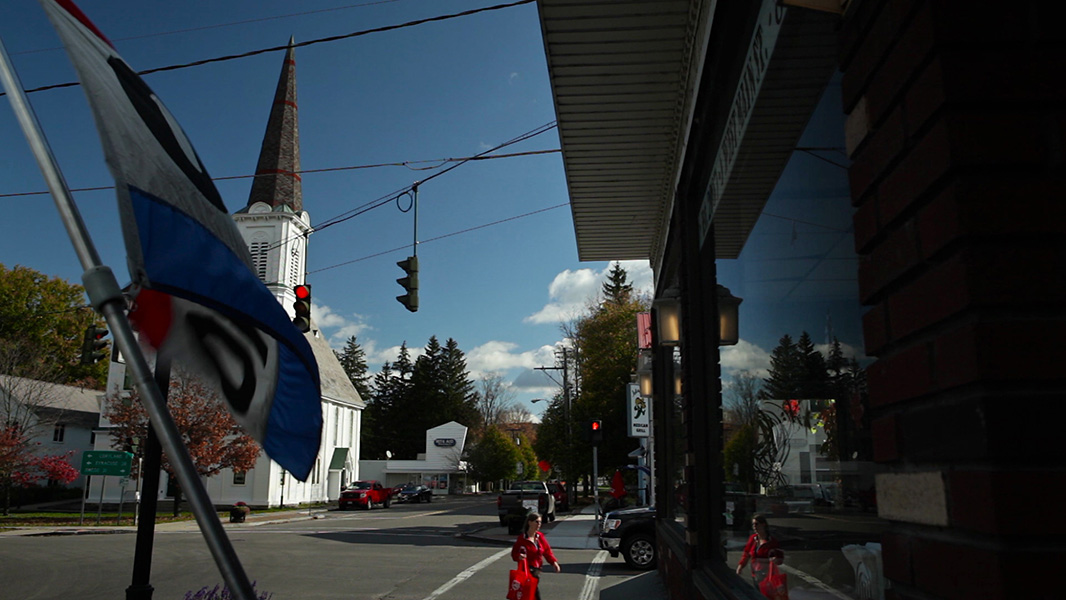
Downtown Dryden, NY (Photo: Chris Jordan-Bloch/Earthustice)
The small town of Dryden is located in upstate New York, nestled among farms and rolling hills. Parades down Main Street, picnics at nearby Dryden Lake and the famed annual Dryden Dairy Day — celebrating community and local farmers — are all hallmarks of the close-knit town.
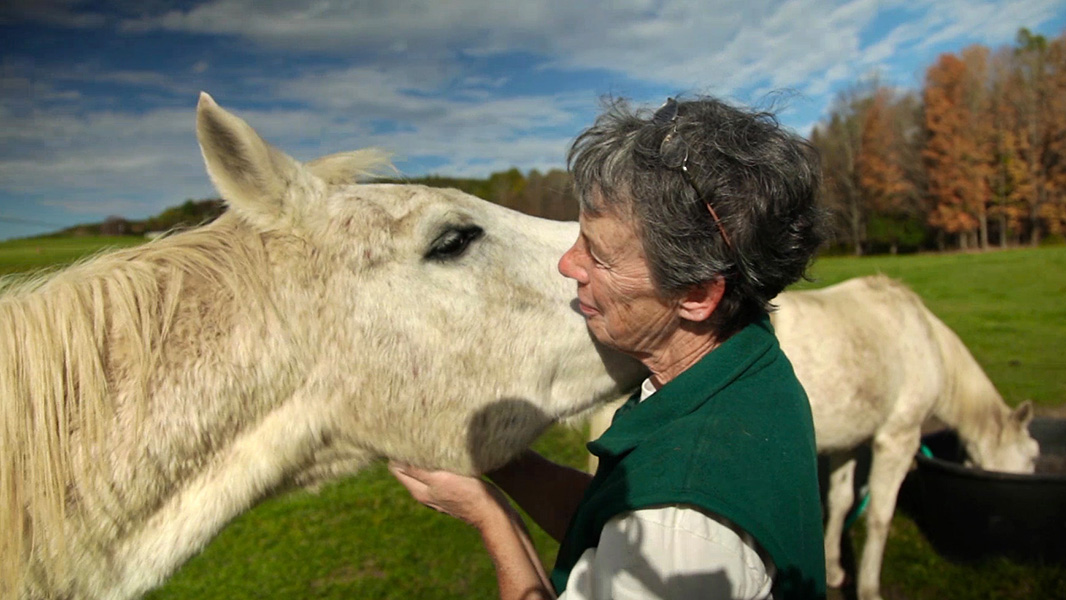
Marie McRae on her farm in Dryden, NY. (Photo: Chris Jordan-Bloch/Earthjustice)
Marie McRae has farmed in Dryden for nearly 30 years. She loves her peaceful plot of land. “I tell people that at night, it’s so quiet you can almost hear the Milky Way.”
In 2007, she was approached by a representative of the oil and gas industry, known as a landman, who wanted to lease her land to drill for gas. She told him no. Over the next year, the landman hounded McRae, approaching her six more times. He told her even if she didn’t lease her land, they would still drill. Signing the lease was the only way she could protect her farm, he said. So Marie signed the lease.
She had no idea what would come next. Her lessons and her journey were just beginning.
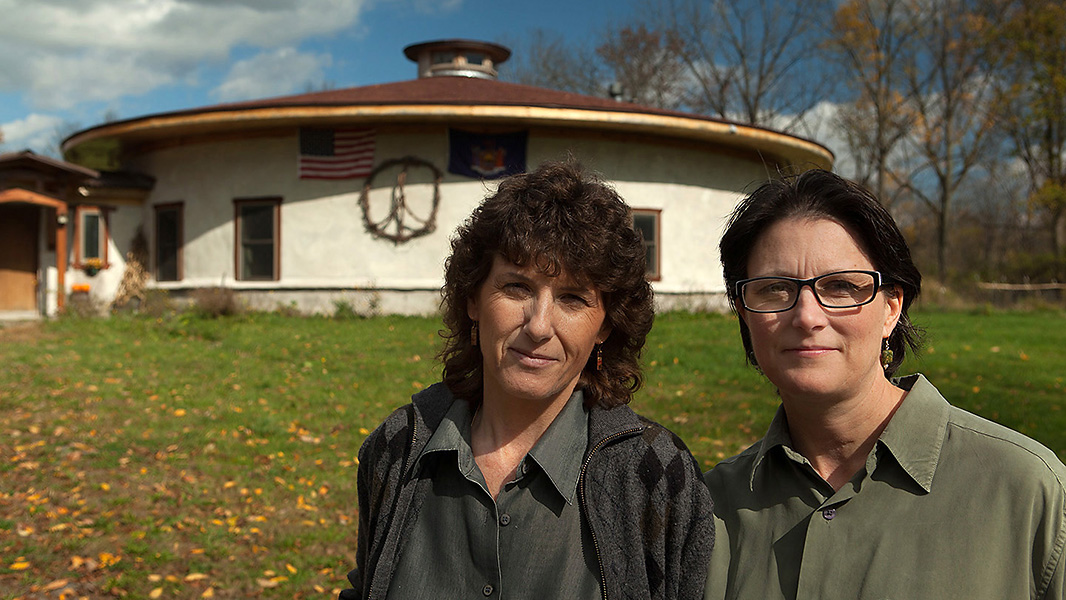
Deborah and Joanne Cipolla-Dennis at their home in Dryden, NY. (Photo: Chris Jordan-Bloch/Earthjustice)
Deborah and Joanne Cipolla-Dennis are a happily married couple living in Dryden. They had recently moved to town after searching far and wide for a tolerant, rural community where they could build their dream home.
Soon after they had begun construction on their energy-efficient home made with all green materials, they too were approached by the oil and gas industry. The couple refused to sign the lease. Not long after they turned down the industry, they met Marie. Marie shared her story and suggested that they join with her and other neighbors to learn more about the oil and gas industry’s plans for their town.
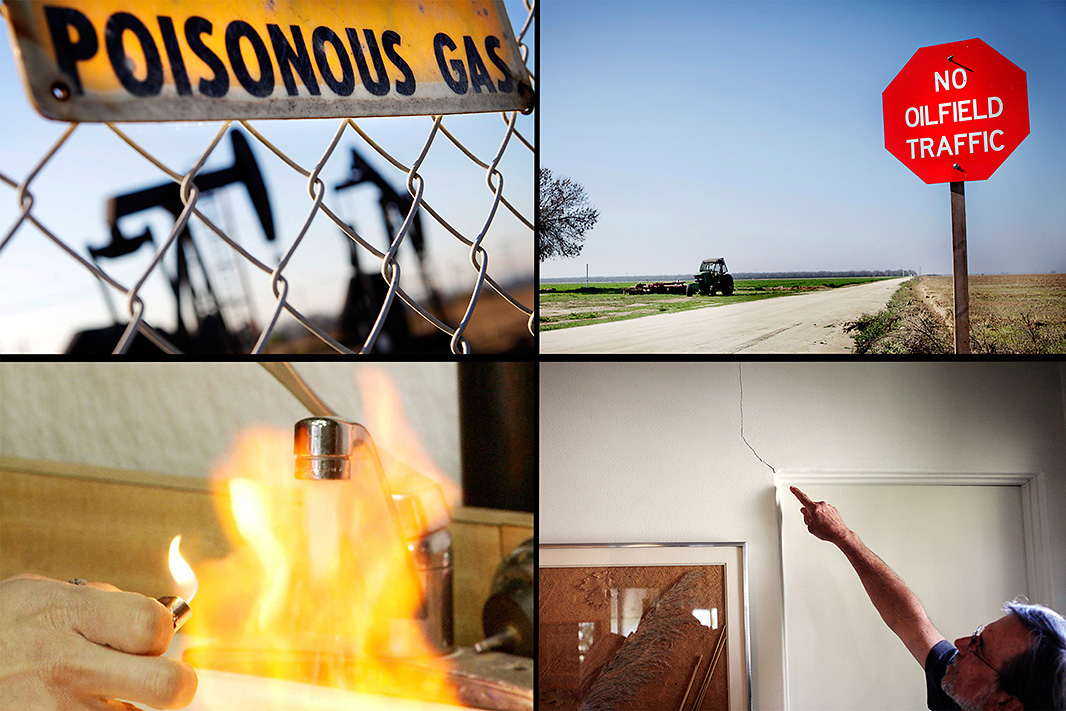
Air pollution, traffic problems, water contamination and earthquakes have occurred in communities near fracking sites. (Photo: Chris Jordan-Bloch/Earthjustice)
Marie, Joanne and Deborah learned that Dryden was just one of many places being targeted as part of a nationwide oil and gas rush sped along by what was then a little-known technique called hydraulic fracturing, or fracking. The process involves mixing water and chemicals together and shooting them deep underground to release gas and oil from the bedrock. The process has been linked to air and water contamination, industrial explosions, even earthquakes.
“The more I learned, the more I couldn’t believe what I had done by signing the lease. I had to find a way to stop them from coming and ruining our town,” McRae said.
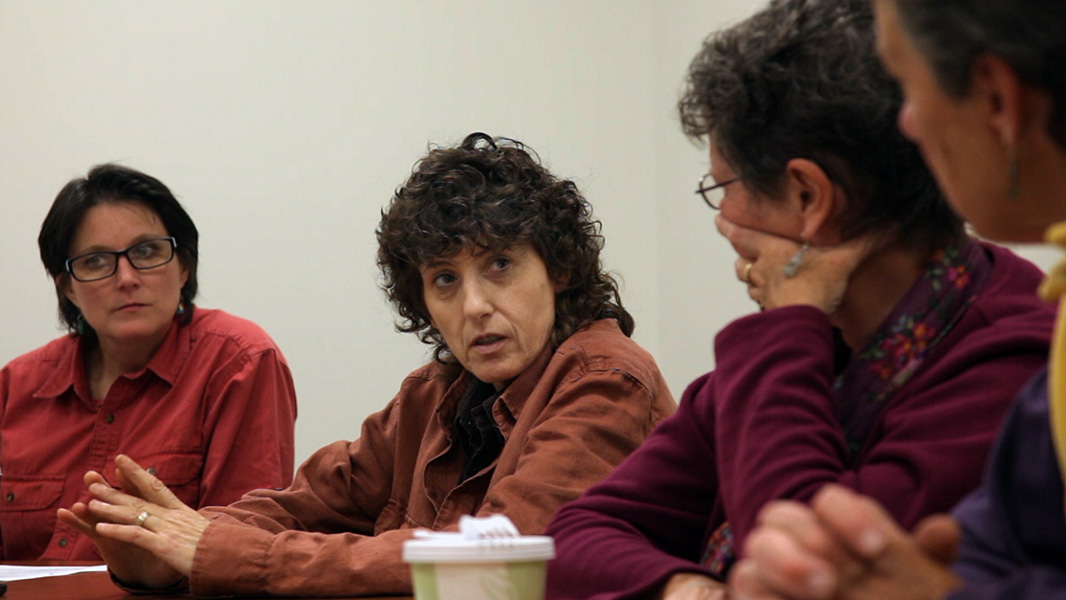
Joanne Cipolla-Dennis at a Dryden Resource Awareness Coalition (DRAC) meeting. (Photo: Chris Jordan-Bloch/Earthjustice)
“The industry kept saying: ‘We have the power; you have none. We are coming. Get out of the way or leave,'” said Joanne Cipolla-Dennis. “At the meetings we were trying to figure out if there was anything we could do. We were like deer in headlights.” But word was spreading about a way that towns could fight back. Two lawyers from a nearby town had done some research into New York state law — and what they found was promising.
“There was a way to help our town, but we had to act quickly.”
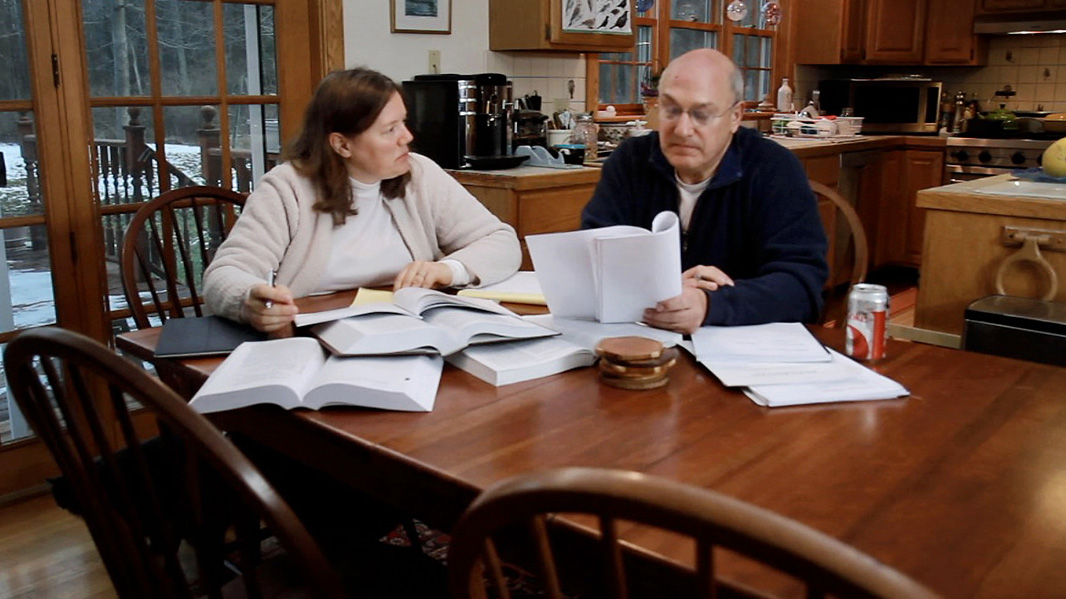
Helen and David Slottje in their upstate New York home. (Photo: Chris Jordan-Bloch/Earthjustice)
–Helen Slottje
Attorney & Goldman Environmental Prize Recipient
“We couldn’t regulate the industry, but we could tell them they couldn’t be here at all,” said Helen. “It was sort of an ‘emperor has no clothes’ moment.”
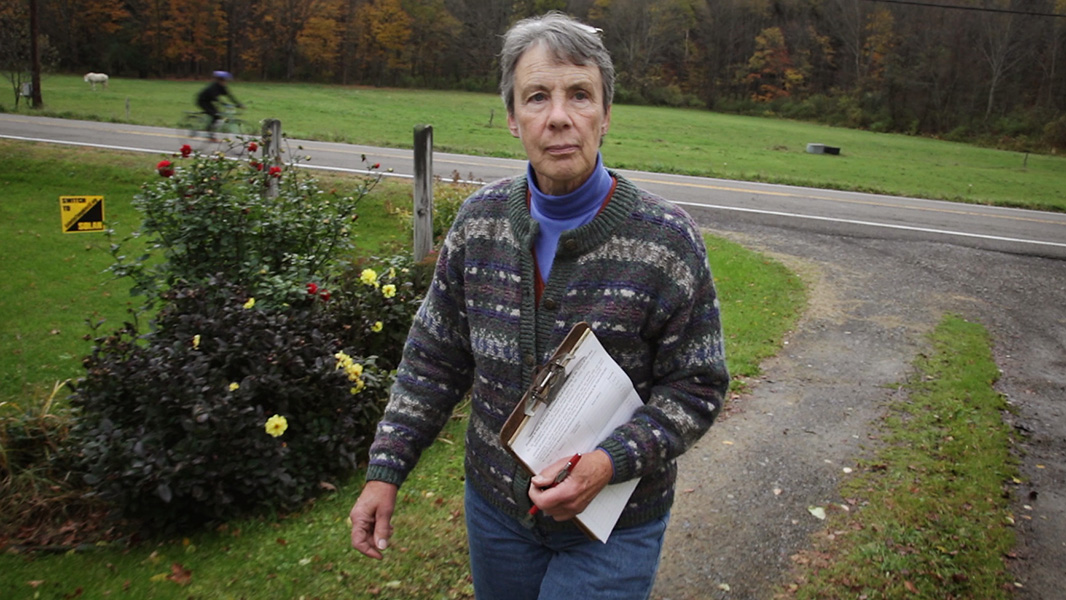
Marie McRae gathers signatures for a petition to ban fracking in Dryden. (Photo: Chris Jordan-Bloch/Earthjustice)
The Slottjes explained to Marie and other members of Dryden Resource Awareness Coalition that the first step was to gather signatures on a petition calling for a fracking ban in their town. The petition would show local officials how many people in town were concerned about the process.
“I thought the industry was so powerful and that there was nothing I could do,” said McRae. “Then I learned there was something I could do just by talking to my neighbors.”
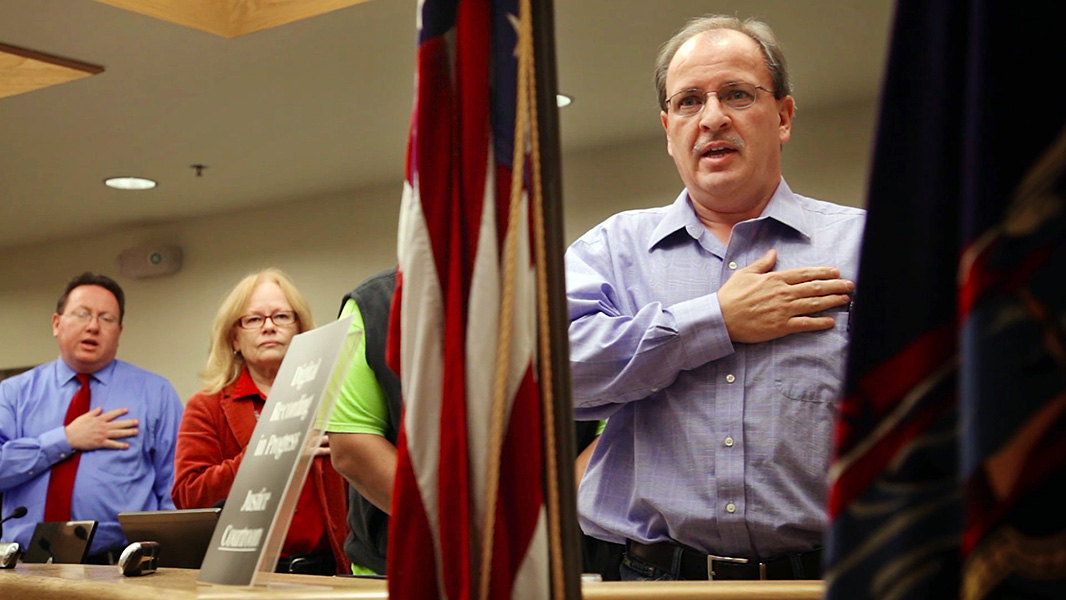
The Dryden town board says the Pledge of Allegiance prior to a town hall meeting. (Photo: Chris Jordan-Bloch/Earthjustice)
When the petition was delivered and the town board members saw the number of signatures, they knew they had to pay attention. “We had enough signatures to win an election, and that’s why our board paid attention to us,” said Joanne. The signatures were from all parts of town and from across the political party spectrum.
After receiving the petition, holding a public comment period and debating through hours of meetings, the bipartisan board voted unanimously to ban fracking in Dryden. It was a huge victory for the town and for all of the people who had worked so hard to protect it.
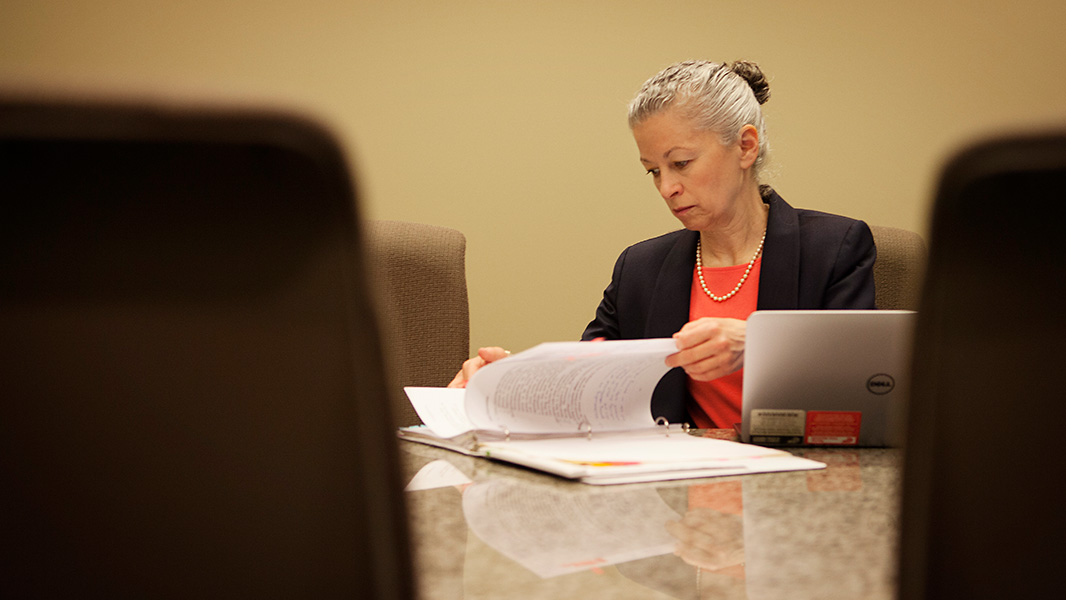
Earthjustice Managing Attorney Deborah Goldberg prepares for oral arguments in the Dryden court case. (Photo: Chris Jordan-Bloch/Earthjustice)
Six weeks after Dryden’s vote, a billionaire-owned oil and gas company sued to overturn the town’s fracking ban. When the company lost and appealed, Dryden leaders came to Earthjustice for legal representation. “The people of Dryden stood up to defend their way of life against the oil and gas industry,” said Earthjustice Managing Attorney Deborah Goldberg.
“The town has a very strong case. Previous courts have ruled that localities retain their longstanding power to regulate land use, including by prohibiting industrial activities such as gas development in their communities. We’ll do everything we can to ensure this victory stands.”
After Dryden passed their ban more than 170 other towns in New York followed suit. The fate of those towns — and many more that hoped to pass bans — hung in the balance as the case advanced through the legal system.
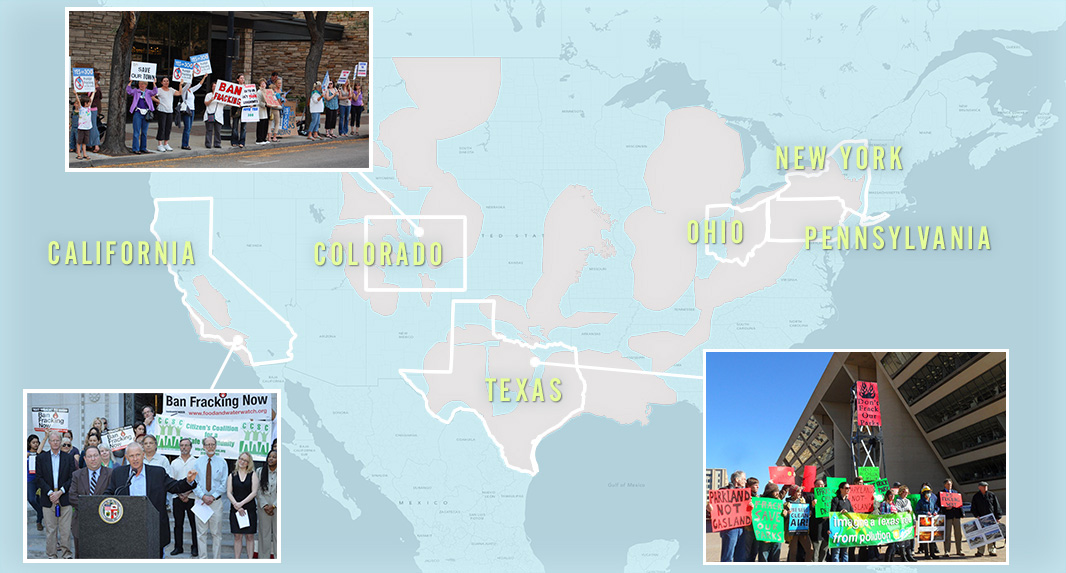
Communities throughout the United States began to pass similar measures, including in the highlighted states. Shale basins—areas of potential fracking—are shaded in red. Clockwise from top: Citizens in Longmont, CO, call for fracking bans within city limits (photo by FreeRangeLongmont.com). A rally in Dallas, TX (photo courtesy of Texas Campaign for the Environment). Los Angeles Councilmember Mike Bonin speaks at a press conference after introducing a motion to place a moratorium on fracking within city limits (photo courtesy of Mike Bonin's office).
The federal government and many state governments have been slow to respond to public health and environmental threats posed by the nation’s new oil and gas drilling boom, which has been enabled by fracking. This has left local communities as an important line of defense.
As the Dryden case advanced, winning in two lower courts, other communities started to take action. In addition to the more than 170 towns in New York, communities in Colorado, Pennsylvania, Texas, Ohio and California have all taken action to protect their local communities from fracking.
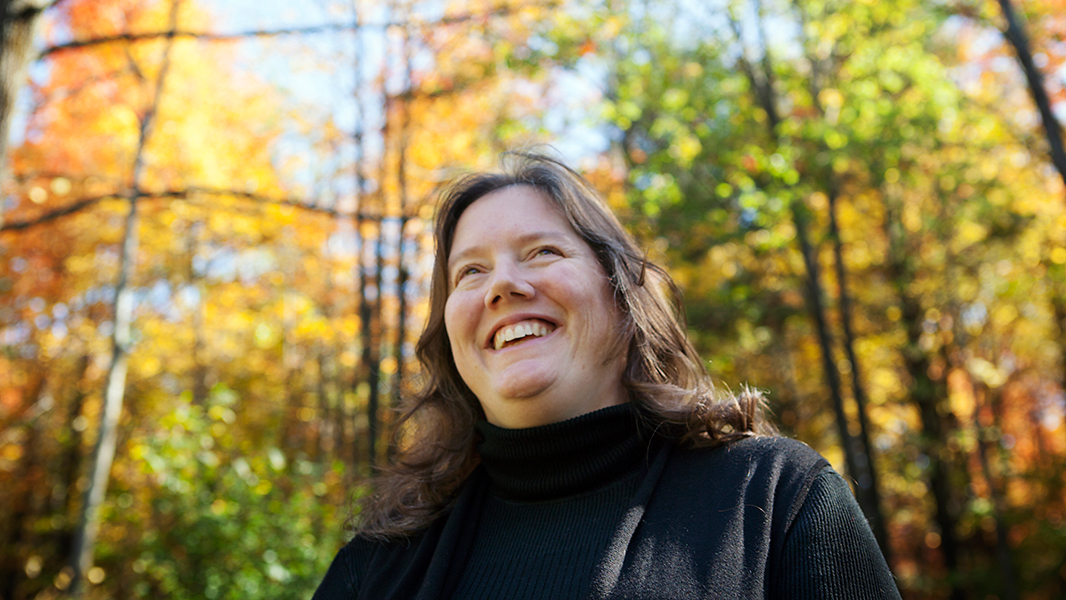
Helen Slottje in her backyard during the fall of 2013. (Photo: Chris Jordan-Bloch/Earthjustice)
After her legal research helped communities throughout New York stand up to the oil and gas industry using local zoning laws, Helen Slottje was awarded the Goldman Environmental Prize. Also known as the “Green Nobel Prize,” it is the top honor that an environmental activist can receive.
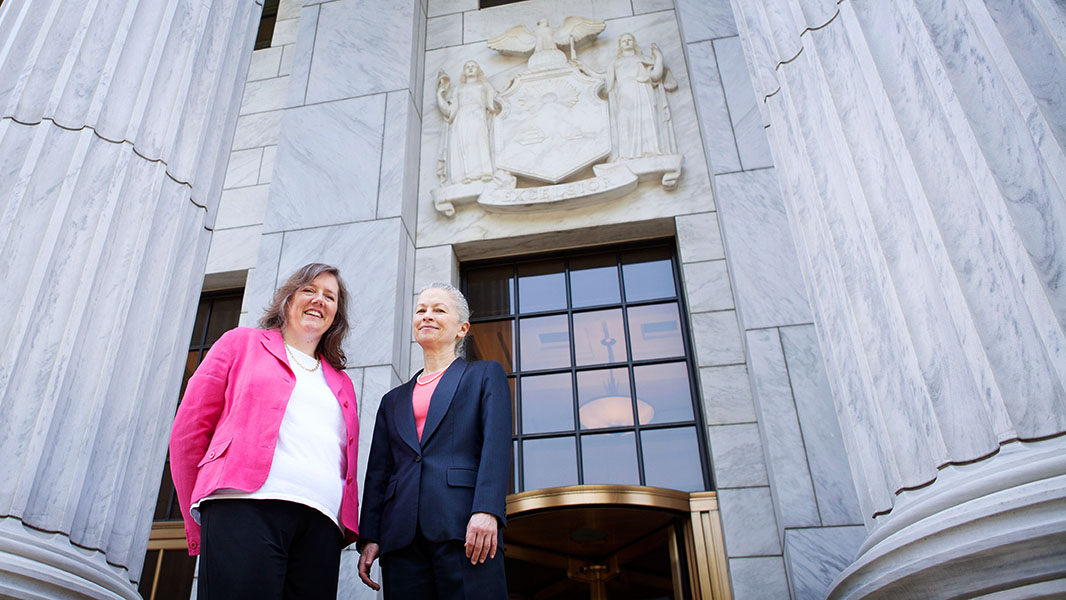
Helen Slottje and Deborah Goldberg stand on the steps of the Court of Appeals in Albany on June 3, 2014, shortly before oral arguments. (Photo: Chris Jordan-Bloch/Earthjustice)
The Dryden case made it all the way to Court of Appeals, New York’s highest court.
Helen and David Slottje’s legal research had paved the way for Dryden’s law on fracking and Deborah Goldberg was fighting to keep it on the books.
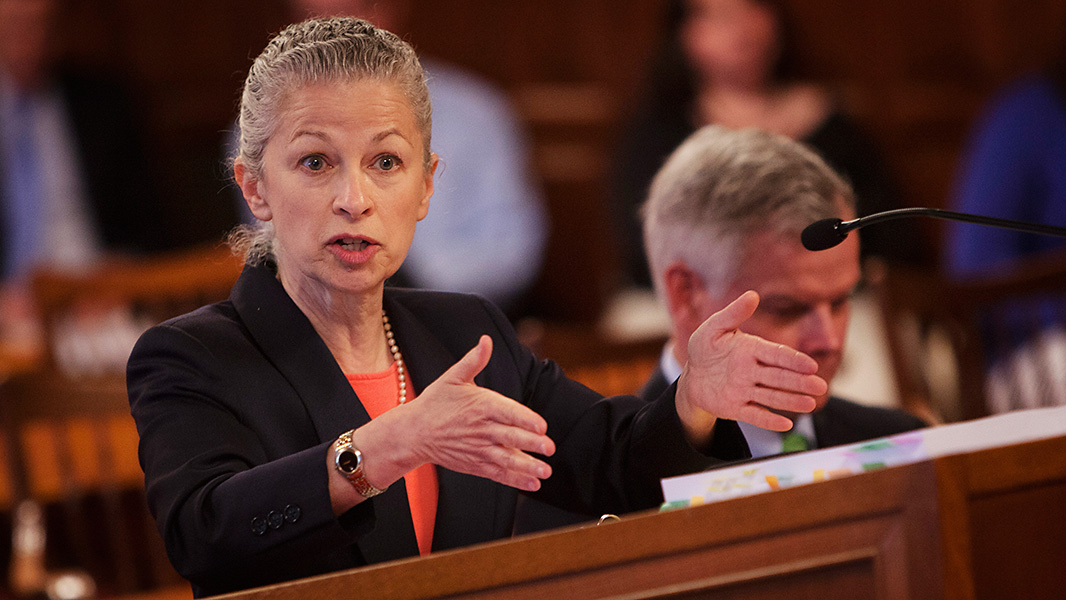
Deborah Goldberg argues before the Court of Appeals on June 3, 2014. (Photo: Chris Jordan-Bloch/Earthjustice)
Goldberg argued that the New York State Legislature had not, in a 1981 law, granted the oil and gas industry the right to override long-held zoning powers of municipalities. “The idea that this industry would get the extreme and unprecedented right that no other industry has ever received in the state of New York simply because we want to promote the oil and gas industry” makes no sense, she said. “We’re not promoting it at all costs.”
The questions from the court justices were rapid-fire and tough. But drawing on her nearly 25 years of courtroom experience, Goldberg stood strong. Prior to the case, more than 50 municipalities, 25 businesses, 10 law professors and numerous environmental groups had all filed friend-of-the-court briefs on behalf of Dryden in the case.
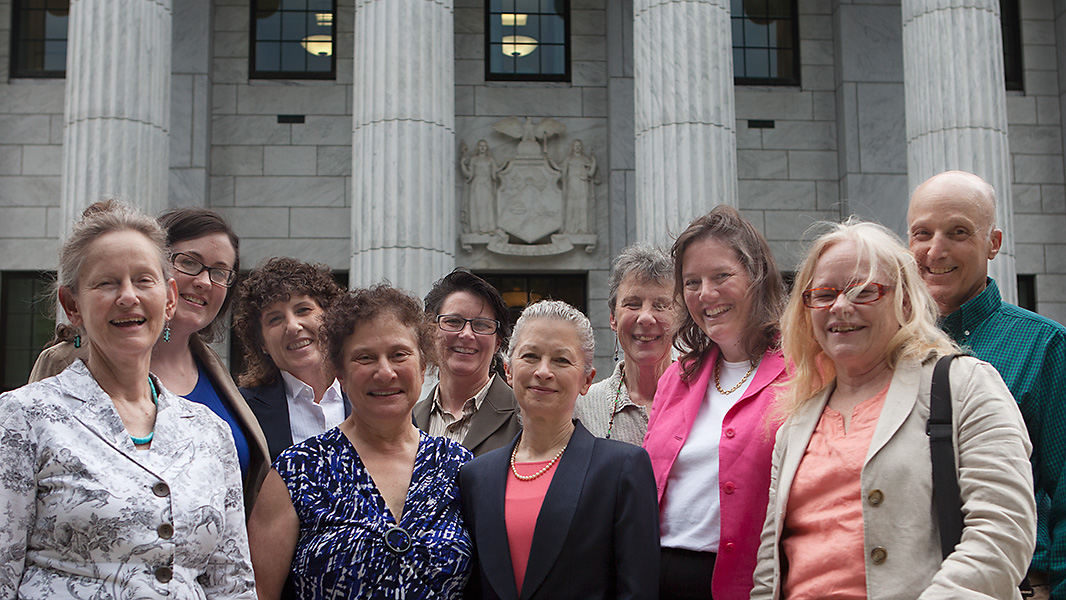
Residents of Dryden smile, with Helen Slottje and Earthjustice’s Deborah Goldberg and Kathleen Sutcliffe, after the high court argument in Albany. (Photo: Chris Jordan-Bloch/Earthjustice)
On June 30, 2014, the Court of Appeals handed down a landmark decision, ruling that New York municipalities have the right to keep fracking out of their borders, a victory for Dryden and communities across the state. The town of Dryden had fought fracking. And, at long last, they had won.
Dryden’s victory set a statewide precedent upholding the rights of local communities to use their zoning powers to ban or limit fracking. The success bolsters efforts in communities across the country — from Pennsylvania to California.
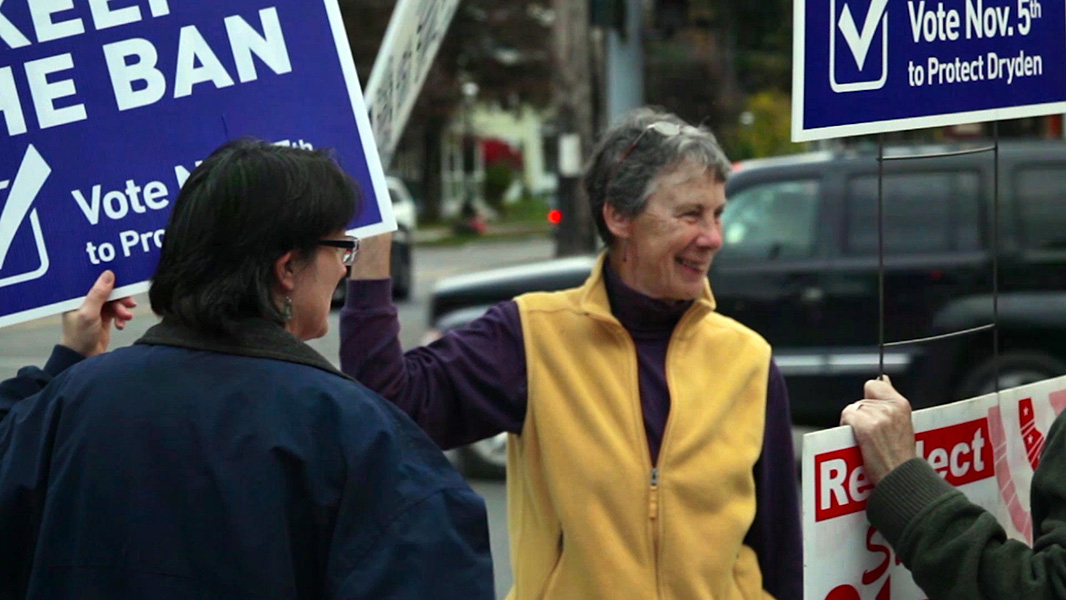
Marie McRae and the Cippolla-Dennis' smile in streets as they hold signs in support of the Dryden fracking ban. (Photo: Chris Jordan-Bloch/Earthjustice)
–Marie McRae
Resident, Town of Dryden
“Every community across this nation can do what Dryden did,” added Joanne Cipolla-Dennis.
“You have to care about each other. That’s the American Dream: you count on your neighbor.”

